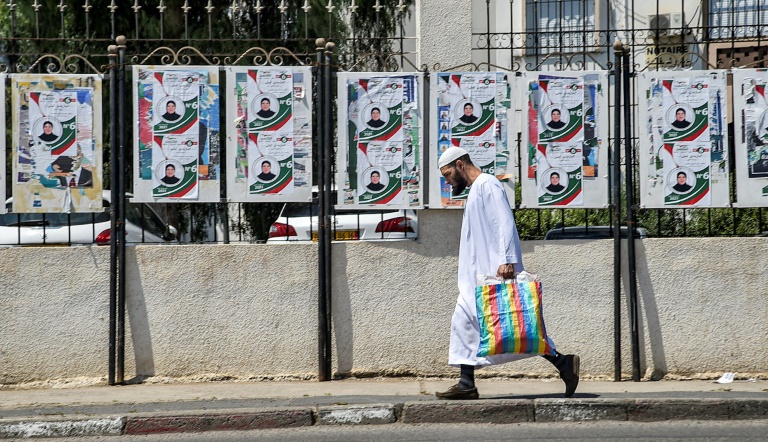Algeria was voting Saturday in a parliamentary election overshadowed by a crackdown on a long-running protest movement that has campaigned for a mass boycott.
Pro-government parties have urged a big turnout for the “crucial vote” which they hope will restore stability after two years of turmoil since the forced resignation of veteran president Abdelaziz Bouteflika.
The protest movement, which had held weekly demonstrations for reform until they were effectively banned last month, has denounced the election as a “sham” that betrays the hopes of the hundreds of thousands of Algerians whose protests forced Bouteflika from power.
Seven leading protest movement figures were arrested ahead of polling day while police deployed heavily in the capital Algiers to preempt any attempt to protest.
Polls close at 7:00 pm (1800 GMT) and results are not expected before the coming days.
Authorities are hoping for a solid turnout, but the two previous national votes since Bouteflika stepped down — a presidential election and a constitutional referendum — both saw record low figures after the protest movement urged a boycott.
Those who do vote in Africa’s biggest nation must choose from a field of more than 13,000 candidates for the 407 seats in parliament, more than half listed as “independent”.
The head of the Algerian League for the Defence of Human Rights, Said Salhi, has denounced the crackdown that preceded the vote.
The “repressive atmosphere and the restrictions placed on human rights and freedoms mean these elections have no democratic value”, Salhi said.
Farida Hamidi, a Paris activist of the protest movement, known as Hirak in Arabic, said the election meant little to young Algerians dreaming of change.
“We reject it all: the president, the parliament, the constitution, everything done by this military junta which has been ruling Algeria since 1962 — we want something else,” she said.
– ‘Clampdown’ –
The Hirak has urged boycotts of all national polls since it mobilised hundreds of thousands of people in 2019 to force Bouteflika and his cronies from power, after the ailing president launched a bid for a fifth term.
It returned to the streets in February after an almost-year-long break due to the Covid pandemic.
But the government stepped up its crackdown against the Hirak last month, blocking protests and detaining hundreds of activists who have defied new restrictions on public gatherings.
Late Thursday, leading opposition figure Karim Tabbou, independent journalist Khaled Drareni and the director of a pro-reform radio station, Ihsane El Kadi, were among seven people detained. The three were eventually released on Friday night, a campaign group said.
“These arrests mark a chilling escalation in the Algerian authorities’ clampdown on the rights to freedom of expression and association,” Amnesty International said in a statement, reporting more than 200 people were in detention in connection with the Hirak movement.
– Old guard and economic woes –
President Abdelmadjid Tebboune claims to have responded to the Hirak’s main demands “in record time”, and says those still protesting are “counter-revolutionaries” in the pay of “foreign parties”.
Armed forces chief Said Chengriha has warned against any “action aimed at disrupting” the vote.
The protest movement says Tebboune’s past role as premier under Bouteflika confirms its narrative that the old guard, in power since Algeria’s 1962 independence from France, retains a firm grip on power.
Established parties linked to Bouteflika’s rule — the National Liberation Front (FLN) and the Democratic National Rally (RND) — are seen as likely to lose seats.
Islamist parties are hoping to take advantage — but with their vote split between five rival factions, they may struggle to make real gains.
Africa’s fourth-largest economy is heavily dependent on oil revenues, which have slumped in the face of the global economic slowdown. Unemployment stands at more than 12 percent, according to World Bank figures.
It has also been hit hard by the coronavirus pandemic, which has claimed more than 3,500 lives in the country, according to the health ministry.










